What is a Master in Applied Ocean Sciences?
MARiS convenes a 13-month coursework (full-time) Master in Applied Ocean Sciences, which is joint between the Department of Biological Sciences and the Department of Oceanography at the University of Cape Town. This course provides interdisciplinary training in treating the most applied aspects of oceanography and marine biology, with the aim of becoming future ocean professionals. It is designed for both recent graduates as well as those with some years’ experience and who wish to gain skills to operate in the ocean services sector, with a focus on operational and conservational activities, food, water quality and recreation, preservation and other aspects of the Blue Economy.
Why do a Master in Applied Ocean Sciences Course?
A. Traditional academic training in disciplinary ocean sciences
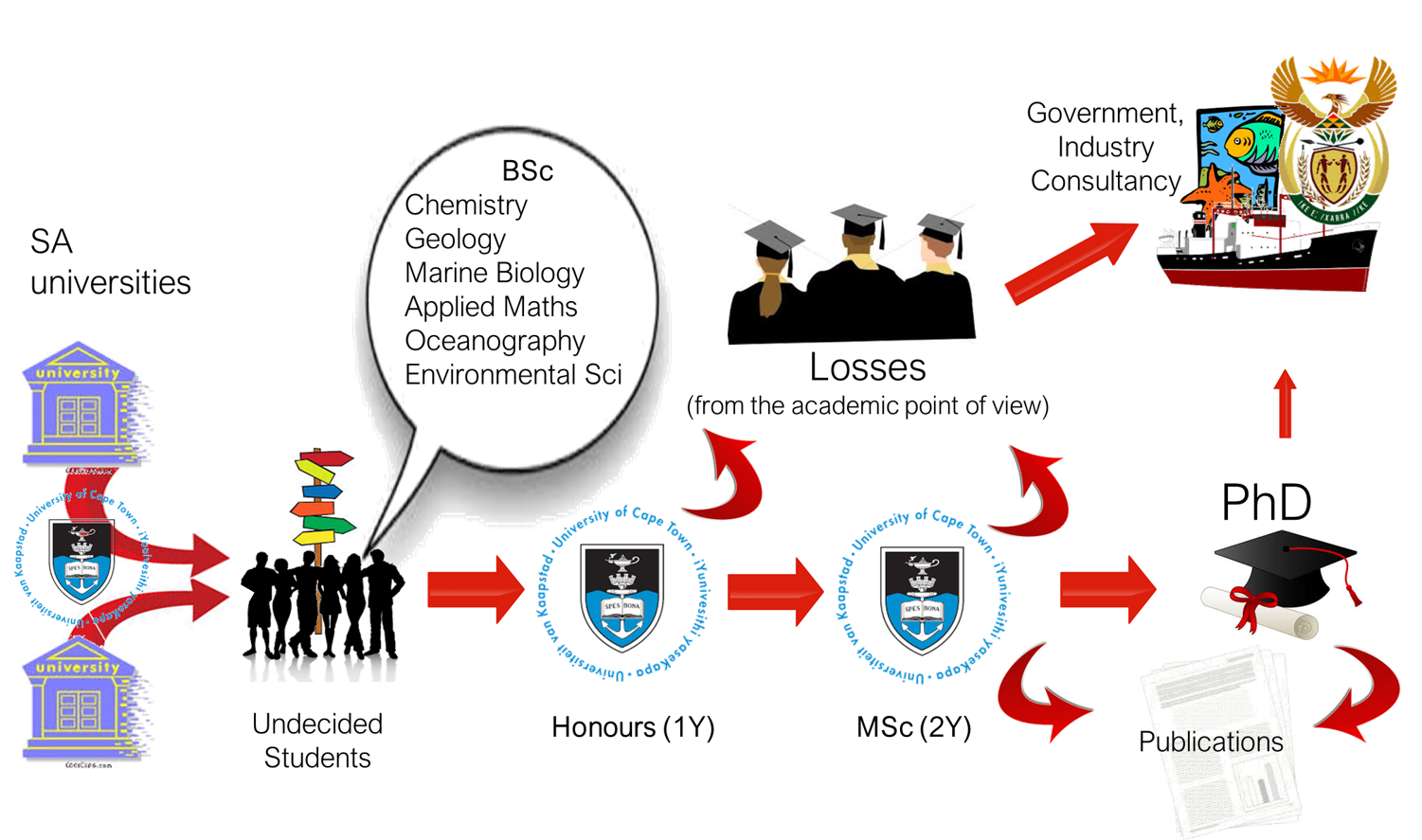
Issues with this model:
- For the Academia, MSc students who are not producing scientific outcomes (contributions to scientific publications) are seen as losses
- Universities need high numbers of Hons and MSc students to ensure that the stock is sufficiently large to provide the best PhDs
- Governmental institutions, private companies and industry in general cannot invest too much into internship support because training is expensive (especially in terms of HR time)
- Companies and governmental institutions need trained and qualified people, but they consider current post-grads to be anchored to the theoretical academic path/training and they are “not professionally ready”
B. Training in Ocean Sciences: the new model
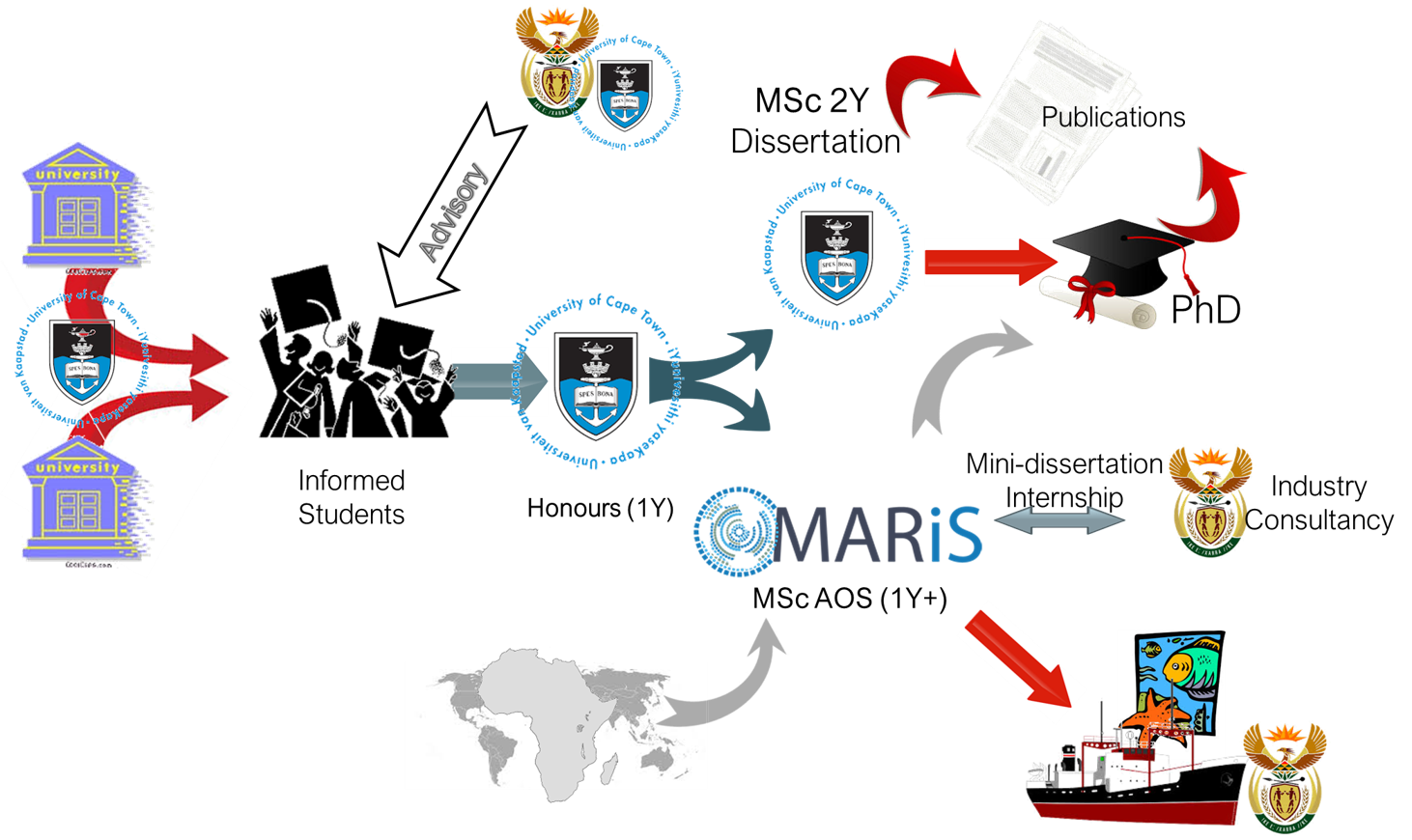
Aims of AOS Masters course
- The Masters degree in Applied Ocean Sciences aims to produce marine professionals with a strong academic foundation who are knowledgeable about the major topics in interdisciplinary ocean sciences
- This course will provide academic and technical skills to deal with the most applied aspects of oceanography and marine biology. It is designed for both recent graduates as well as those with several years’ experience and who wish to work in the ocean services sector, with a focus on operational and conservation activities linked to the Blue Economy. This is achieved by exposing the students to a range of disciplines, to provide them with the requisite skills to carry out research and to use the products of research.
- The course reinforces essential employability skills such as scientific communication, numeracy and analytical thinking, and demonstrates the ability to perform independent research through the project component.
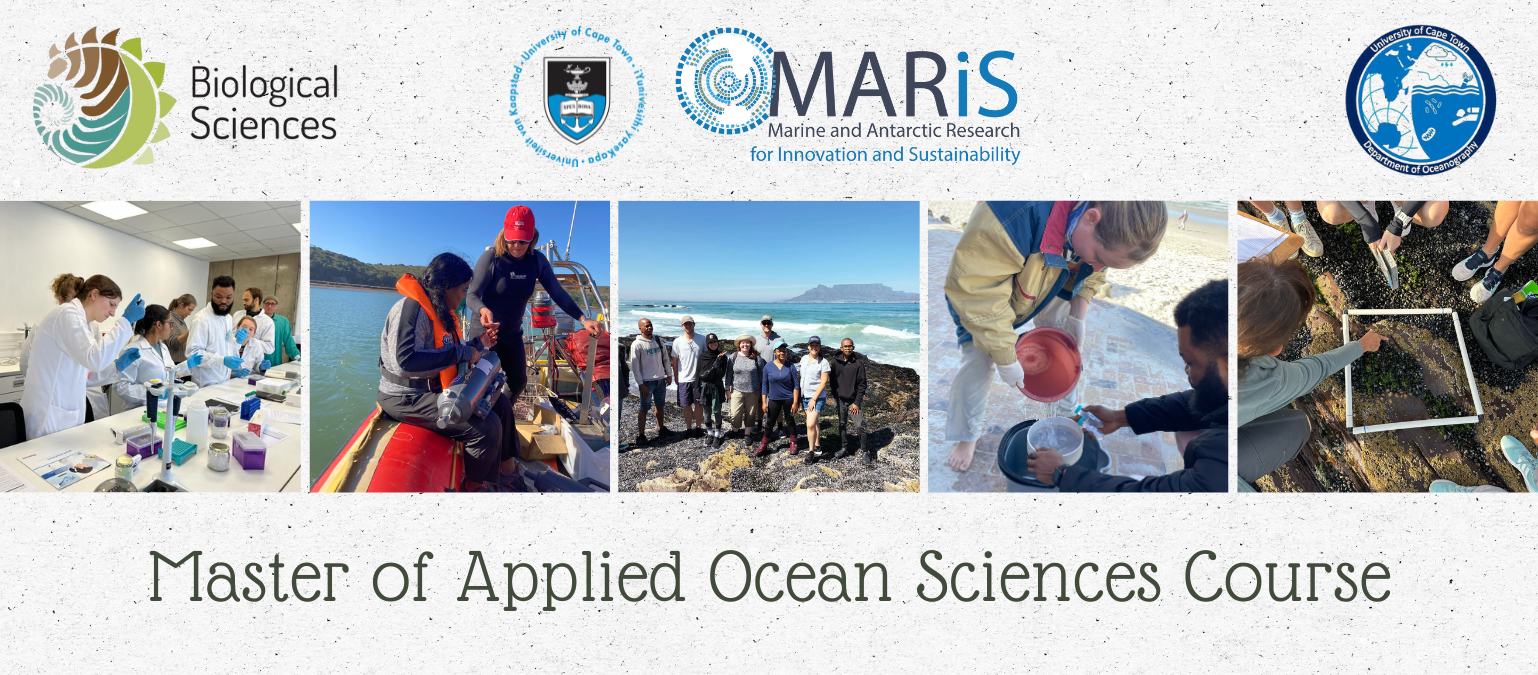
Webinar
To find out more details about the AOS-SAMOS programme for 2026, watch the recorded webinar delivered by the SAMOS team.
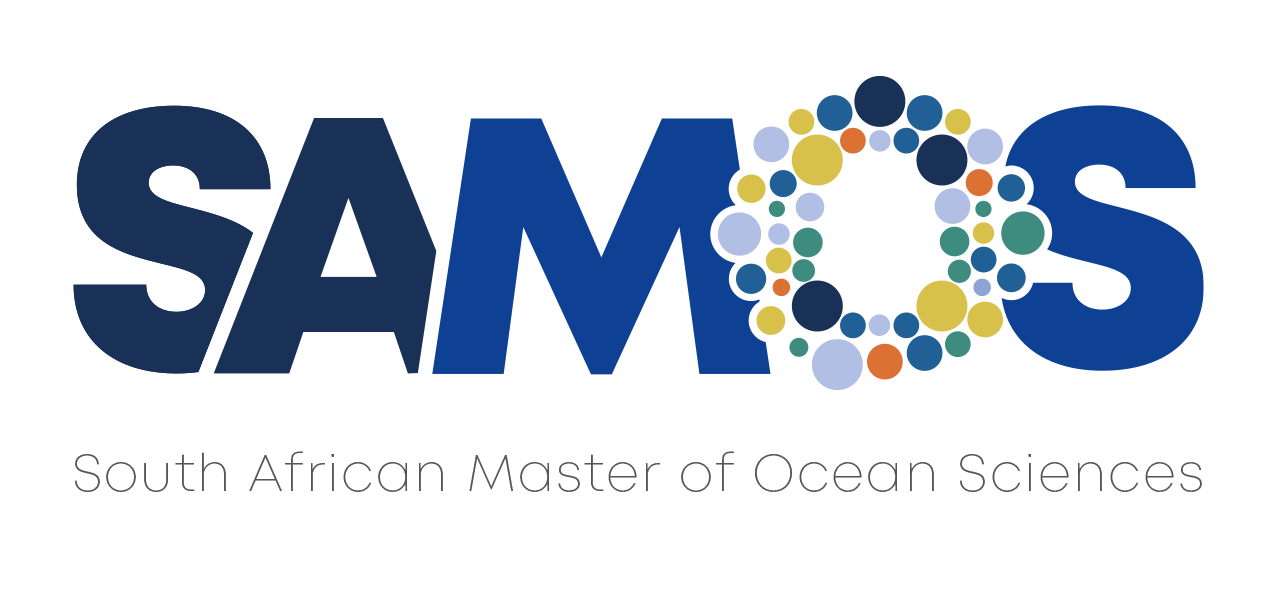
To find out more details about the AOS MSc course, watch the recorded webinar delivered by Prof Marcello Vichi and Dr Cecile Reed:
Part 1 - Overview of AOS MSc course
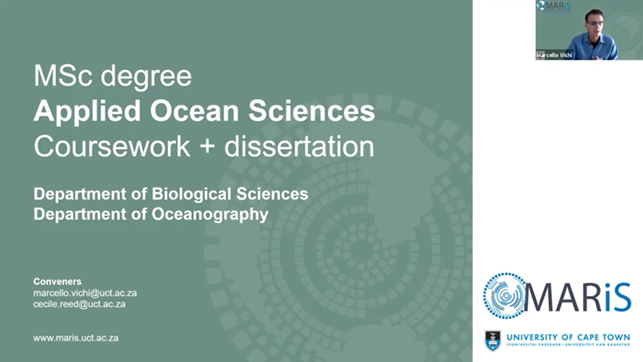
Part 2 - Modules & Dissertation
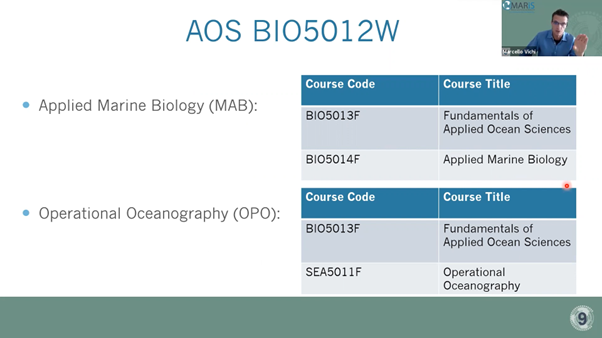
Entry Requirements
1. UCT Science Faculty entry requirements:
For a master’s degree in the Science Faculty: A candidate entering a Master’s degree must have a BSc (Honours) degree or four-year international undergraduate equivalent. The University of Cape Town follows ECCTIS guidelines on equivalency of international degrees. Prospective students should check whether their existing degree qualifies for entry.
2. English Language Proficiency requirements:
The medium of instruction and examination at UCT is English. You must submit evidence of proficiency in English as part of your application to study at UCT. These include any of the following:
For South African applicants, either:
- A pass in English Home Language or First Additional Language if you hold the NSC, or
- 40% In English on the Higher Grade (first or second language) if you hold the Senior Certificate
For international applicants:
A recent TOEFL score (obtained within 3-5 years before application for admission) of at least
- 570 for the paper-based test or
- 230 for the computer-based test or
- 88 for the Internet-based test
A recent overall band score of 7.0 on the International English Language Testing System (IELTS), with no individual element of the test scoring below 6.0
A score of 65% or more for the Academic Literacy component of the NBT.
3. An excellent academic track record with strong interests in marine science.
4. Good numeracy skills are highly recommended.
UCT Science Faculty Admission Requirements
To learn more information about the UCT Science Faculty admission requirements, course information, course fees and funding opportunities, check this link: Science Faculty & Fees, Funding and Financial Assistance Handbooks
Recognition of Prior Learning (RPL) Overview
If you are interested in utilising the RPL method for admission to UCT, we suggest you visit this website for more information or contact Amy Rooks-Smith at the Science Faculty, or call her on 021 650 2082.
Minor-Dissertation Structure & Submission
Format & Structure
There is no standard format for the submission of a dissertation or thesis: formatting is at the candidate’s discretion, but using A4 paper is the expected norm.
- Structure and format of minor-dissertation, refer to Science Faculty Postgraduate Resources - https://science.uct.ac.za/postgraduate-studies-current-
- Refer to Science Faculty Research Examination Process - https://science.uct.ac.za/postgraduate-studies-current-postgraduate-students/examination
Due Dates and Process of Submission
At the conclusion of research, the candidate must submit a dissertation or thesis for examination. This normally occurs after receiving an indication from the supervisor that the product is in a form which is acceptable for submission. However, a candidate is not prevented from submitting without the supervisor’s approval.
If a candidate intends submitting a Masters dissertation for examination he/she must inform the Head of Department in writing, with a copy to the Dean, of such an intention two weeks in advance of planned submission date. The Head of Department, with input from the supervisor, will then nominate suitable examiners for approval by the Dean. More information about this process can be read on the DIGITAL SUBMISSION OF A THESIS/DISSERTATION FOR EXAMINATION AND LIBRARY ACCESS here.
The dates for submission of dissertations and theses are:
First or Second week in February for persons hoping to graduate in September;
First or Second week in August for persons hoping to graduate in March of the following year.
Please refer to the University Fees Booklet for submission dates with respect to fee rebates.
Candidates who submit their dissertation before the beginning of the start of the first term are not required to register. If submitted after the start of the first term a candidate must register for that year, and a pro-rata fee will be charged, depending on the date of submission. Where a student who submitted prior to the start of term is required to revise and resubmit a dissertation/thesis, they must register and pay the academic fee for that year. Further information can be found at the UCT Student Handbook site.
FAQ
Find out more information from our "frequently asked questions" by the public.
AOS Students
Check out the current AOS students and Alumni here.